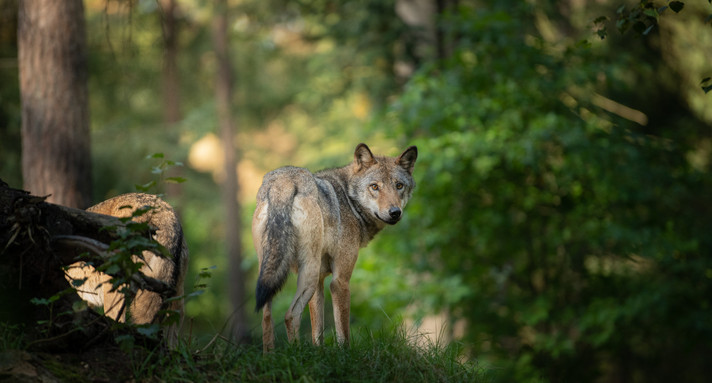Wolf populations in Europe are growing and spreading again. Since single wolves were first detected in Baden-Württemberg back in 2015, individuals have settled in the Black Forest and in the Odenwald.
Wolves are a strictly protected species under national and international law. At the same time, they pose a threat to grazing animals in Baden-Württemberg. Grazing livestock makes an indispensable contribution to the preservation of our cultural landscape with its diverse habitats and in part rare animal and plant species. It is also a traditional and indispensable source of income.
Together with representatives from hunting, agriculture, nature conservation, administration and science, the state government is therefore looking for pragmatic solutions to the challenges posed by the return of the wolf. The overall goal is the reduction of conflicts between wolves, grazing animals and humans. For example, within a "wolf prevention support area", the state supports the acquisition, construction and maintenance of wolf-repellent pasture fences and guard dogs.
Clear evidence (C1) of wolves in Baden-Württemberg
Evidence of wolves is assessed according to the so-called SCALP standardized criteria. The abbreviation means „Status and Conservation of the Alpine Lynx Population”. There are three Categories: C1 (clear evidence by genetic examinations) C2 (Confirmation of traces by an experienced person) and C3 (No Confirmation). Only C1 legally confirms the presence of a wolf to get financial support in a wolf prevention support area. According to this, C1 evidence confirms the presence of a wolf beyond doubt, be it through genetic examinations, film and photo recordings or when a dead animal is discovered. This evidence is compiled in a table.
Clear evidence (C1) of wolves (german version)
What should you do if you encounter a wolf?
In principle, wolves do not pose a danger to humans. Wolves are found only in very low densities and, being cautious animals, usually avoid direct encounters with humans.
Since they can perceive humans from a long distance away, encounters between the two are therefore a rarity even in wolf territories. Germany is free from wild rabies and there is therefore no reason to expect rabid and thus careless or conspicuous wolves.
It is part of the normal behaviour of wolves to occasionally approach settlements, just like foxes, badgers, wild boars and other wild animals. Crossing residential areas, especially at night, is also not uncommon. Sometimes, young wolves can be curious and less cautious towards humans.
Behave as follows if you encounter wolves:
- Treat them with respect, keep your distance, never approach the animals and do not harass them!
- Anyone on foot or bicycle who encounters a wolf that does not retreat should draw attention to themselves and move away slowly!
- If the wolf follows at a certain distance, do not move away hastily, but walk or cycle slowly, emphasising your lack of interest, and speak loudly!
- If you feel uncomfortable, stop, shout loudly and clap your hands, make yourself big and, if the animal approaches further, throw objects!
- Often Wolves are not shy of vehicles or even riders. This is therefore not an unusual or worrying behaviour.
- Do not feed wolves under any circumstances!
- Wolves can view dogs as intruders into their territory and may attack them. Therefore, keep dogs on a leash or keep them close to you.
- Wolves with a prey drive triggered by domestic animals (mostly sheep or goats) can be fixated on the prey.It can be difficult to drive them away even when several humans are present. Do not corner the wolf in this case.
- If you find a dead, sick or injured wolf, do not touch it and do not pursue it! Inform the police or the nature conservation and forestry authorities immediately! Report your observation to the nature conservation authority (wildlife officer, district office, city or regional council) or to the wolf monitoring office at the Forest Research Institute Freiburg (phone +49 761 4018-274, info@wildtiermonitoring.de)

